Sara Ramirez and Cynthia Nixon discuss their roles on And Just Like That...
And Just Like That... actor Sara Ramirez hopes to bring a ‘more nuanced humanity’ to their divisive character in the Sex and the City sequel.
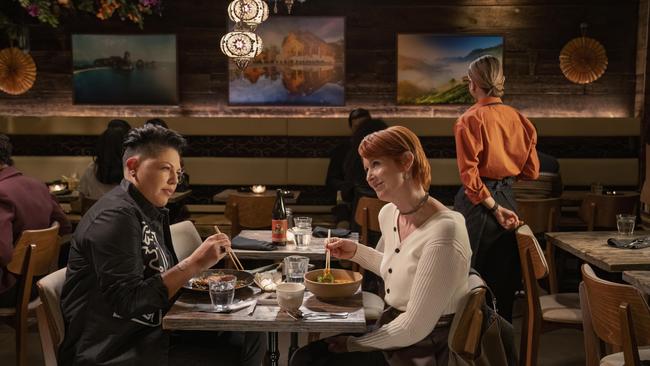
Sara Ramirez is one-half of one of the most controversial couples on television, but the actor insists they are nothing like Che Diaz, the “queer, non-binary Mexican-Irish diva” they portray on And Just Like That …
Che became a divisive figure in the Sex and the City revival’s first season, as much for their affair with Miranda Hobbes (Cynthia Nixon), prompting the end of Miranda’s marriage to Steve Brady (David Eigenberg), as for their in-your-face persona.
Che’s mere presence prompted a wave of memes (many centred on the line of dialogue, “Hey, it’s Che Diaz”) and criticism directed at the character, and also at Ramirez – who is non-binary – as a result. But Mexican-American actor Ramirez, 47, insists the character of Che, a stand-up comedian and podcast host, is not them.
“I’m not at all like Che,” Ramirez says over a Zoom call.
“I’m an introvert, Che is definitely an extrovert – a self-identified narcissist. With Che, you will always get the truth, whether you like what they’re saying, or not. They don’t lie.”
So how has Ramirez dealt with the criticisms of their character? It was a liberating experience for the actor, who rose to prominence on Grey’s Anatomy and has become a social media identity with 2.2 million followers on Instagram.
“It was … freeing to play a character that elicits such a strong reaction, and hopefully sparks important conversations,” Ramirez says.
“It was really fun to get to play someone who, quite frankly, doesn’t care what anybody thinks. In season two, they start to care more about what people think.”
Part of Che’s storyline in season two of AJLT has them shooting a TV pilot (titled Che Pasa) in Los Angeles, in which Who’s The Boss? actor Tony Danza stars as their father, and where they’re confronted by body-shaming, racial stereotypes and the harsh realities of the Hollywood machine.
“While it can be really upsetting for people, and it is for Che, there’s also a lot of hilarity … Many of us who have worked in Hollywood, we know how to laugh about it – those of us who understand how ‘meta’ it is, what we’re portraying.”
Ramirez says they hope the second season of AJLT – which co-stars Nixon, as well as original stars Sarah Jessica Parker and Kristin Davis – shows Che with “a more nuanced humanity”.
“I thought it was needed, I thought it was necessary to get to know them a little better,” Ramirez says. At the time of this interview, they hadn’t yet seen any of the new episodes: “You’re way ahead of me.”
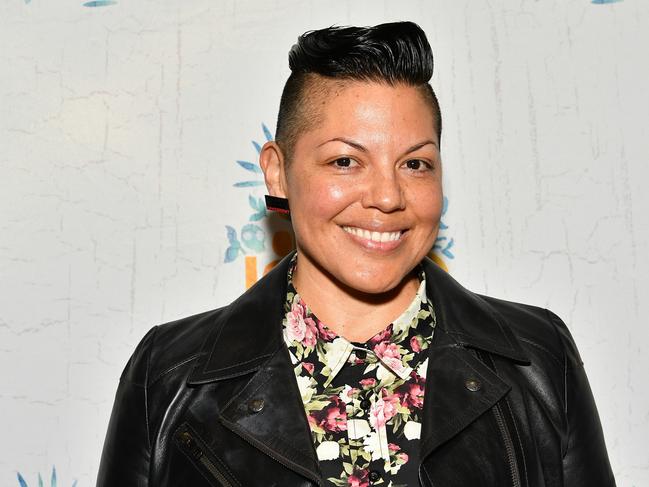
Nixon, 57, reprises her role as New York lawyer turned student activist Miranda, who has – in season two – relocated to Los Angeles to be with Che.
“It’s a little bit back to the old Miranda, the sexually adventurous Miranda back before she was married and settled down,” Nixon says.
“She’s very aware of the things that Che said to her last season, which is, ‘We’re not getting married. This is not a traditional set-up in any way’. For Miranda, she’s in love and she’s in this relationship … and trying to understand, ‘We’re together, but we’re not traditionally together, forever, whatever’. What does that mean?”
For Emmy-winner Nixon – who ran for New York governor in 2018 – the character has evolved similarly to herself.
“When the original series started, I felt like I wasn’t like Miranda at all. I was very domestic, I was a mother already, I was in a committed, long-term relationship. I had never dated much, I had long-term boyfriends, that was it. And I certainly was a career person like Miranda, but I wasn’t in this corporate world.
“But then, I have to say, Miranda in the course of the series, she became a mother, she fell in love, she became a more nurturing person. And maybe I got from her some of her strength, and by the end of the series, I realised, ‘Oh I am completely like Miranda in every way.’
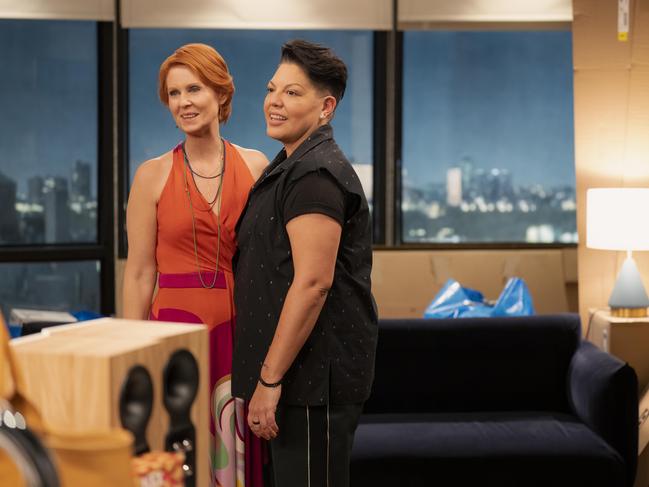
“Certainly now, being on the show (is) allowing Miranda – as I am – to be a more political person. I’m not with a non-binary person, I’m with another woman … I have three children, she has one. One of my children is close to Brady’s age, so I know what that’s like, you know?”
Of interest to both Nixon and her on-screen character is social justice, and what she calls “this kind of growing political consciousness, this desire to be part of dismantling white supremacy, fighting back against Trump and xenophobia”.
“What we saw (in AJLT’s first season) was kind of like a younger Miranda that had the ferocity the way she used to. There were these new injustices that she was keenly waking up to. It was her old ferocity back – so to me, it seemed very familiar.”
Nixon compares the character of Miranda as she was in the original series of Sex and the City – which marked its 25th anniversary earlier this month – with her later development in And Just Like That …
“I feel like this is always who Miranda has been, a person who fought for her career, for equal treatment, advancement in her law firm,” Nixon says.
“And then when she became a mother and decided to get married, these were things that were startling to her, and not particularly part of the life that she saw for herself, but she was so thrilled and surprised to realise these were things that she wanted, and made her life so much fuller and richer.
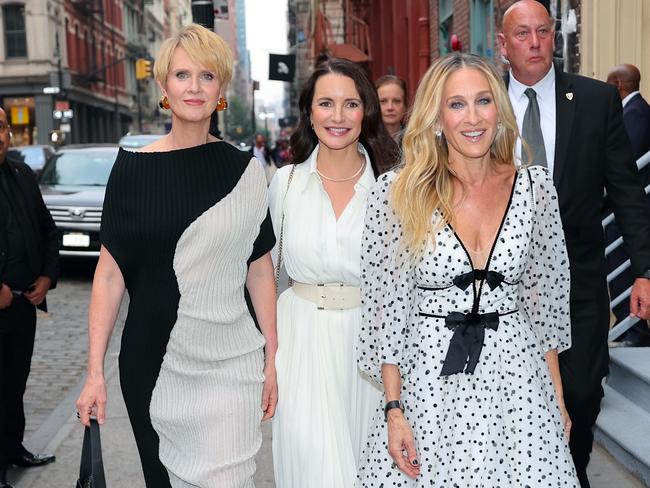
“Miranda’s falling in love with Che, and Miranda’s decision to end her marriage, all of these things – yeah, sometimes you get married and it lasts until one of you dies. And sometimes you get married and you reach the end of the road. And it doesn’t mean the marriage was a mistake … it’s just that the marriage ended. And I think it’s important … to say, ‘Hey, I love this person, I used to be in love with them, I’m not any more. I’m sort of dead here in this relationship. And it’s not something I want for myself, and it’s not fair to the person I am married to. They deserve a person who wants to be there, not a person who is sleepwalking.’ ”
Asked in what ways Sex and the City – which made its debut on US network HBO in 1998 – changed the portrayal of women on TV, Nixon says: “When the original show started, the idea that there were women who were quote-unquote ‘nice girls’ to some degree, (who) were having a lot of sex, and were speaking about it frankly with each other and the men they were dating, was I think kind of eye-opening and shocking.
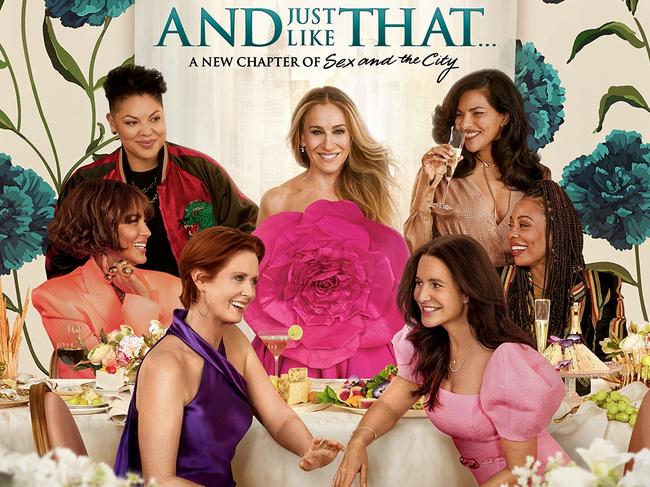
“The idea that there were these women in their 30s who were bright and attractive, and could get married but weren’t necessarily rushing off to do that, was also really eye-opening to people.
“There was some sense of, ‘Are people going to watch a show where the main characters are all women?’ And the answer was, of course, yes, they are.”
Season two of And Just Like That ... premieres on Thursday on Binge.


To join the conversation, please log in. Don't have an account? Register
Join the conversation, you are commenting as Logout